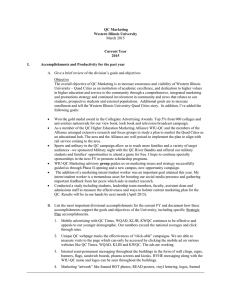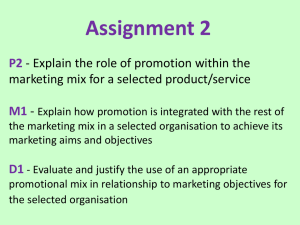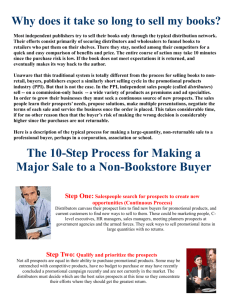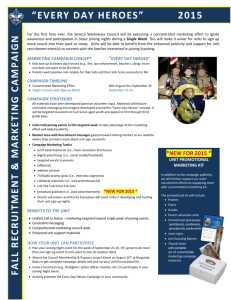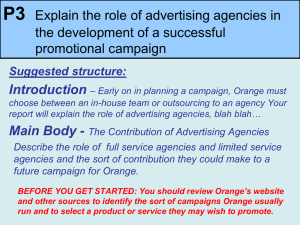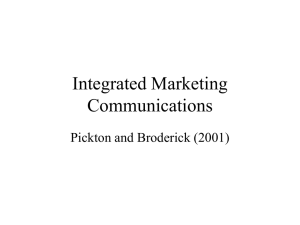Job Title: Product Marketing Manager – Informa Pharma Reporting
advertisement
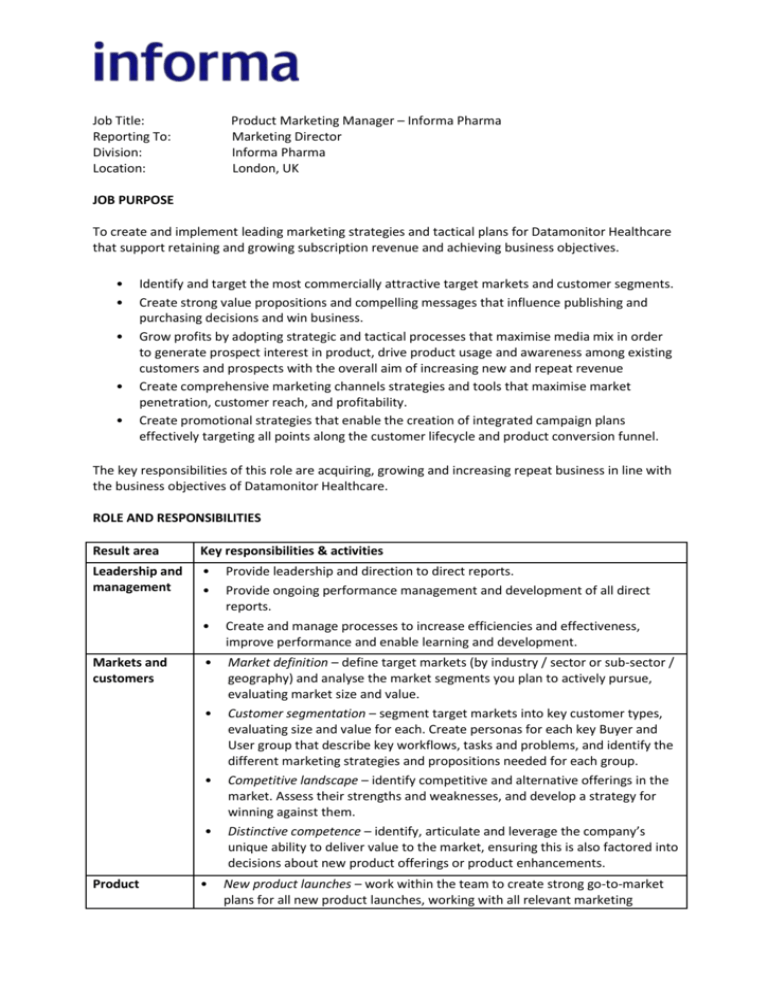
Job Title: Reporting To: Division: Location: Product Marketing Manager – Informa Pharma Marketing Director Informa Pharma London, UK JOB PURPOSE To create and implement leading marketing strategies and tactical plans for Datamonitor Healthcare that support retaining and growing subscription revenue and achieving business objectives. • • • • • Identify and target the most commercially attractive target markets and customer segments. Create strong value propositions and compelling messages that influence publishing and purchasing decisions and win business. Grow profits by adopting strategic and tactical processes that maximise media mix in order to generate prospect interest in product, drive product usage and awareness among existing customers and prospects with the overall aim of increasing new and repeat revenue Create comprehensive marketing channels strategies and tools that maximise market penetration, customer reach, and profitability. Create promotional strategies that enable the creation of integrated campaign plans effectively targeting all points along the customer lifecycle and product conversion funnel. The key responsibilities of this role are acquiring, growing and increasing repeat business in line with the business objectives of Datamonitor Healthcare. ROLE AND RESPONSIBILITIES Result area Key responsibilities & activities Leadership and management • • • Markets and customers • • • • Product • Provide leadership and direction to direct reports. Provide ongoing performance management and development of all direct reports. Create and manage processes to increase efficiencies and effectiveness, improve performance and enable learning and development. Market definition – define target markets (by industry / sector or sub-sector / geography) and analyse the market segments you plan to actively pursue, evaluating market size and value. Customer segmentation – segment target markets into key customer types, evaluating size and value for each. Create personas for each key Buyer and User group that describe key workflows, tasks and problems, and identify the different marketing strategies and propositions needed for each group. Competitive landscape – identify competitive and alternative offerings in the market. Assess their strengths and weaknesses, and develop a strategy for winning against them. Distinctive competence – identify, articulate and leverage the company’s unique ability to deliver value to the market, ensuring this is also factored into decisions about new product offerings or product enhancements. New product launches – work within the team to create strong go-to-market plans for all new product launches, working with all relevant marketing • channels to ensure successful delivery of the plan. Branding and communication – work with business head and team designers to develop strong product brands, ensuring that brand design, logos, attributes and identity, and key brand messages are all clearly defined and consistently applied through all customer touch points. Create positioning statements for internal use, and customer messages for external use, that articulate how the product solves customer problems and to ensure consistent internal and external communications across all functions. Channel strategies and tactics • Communications strategy – create and implement customer communications strategy for the product, in order to optimize customer reach and routes to market, and drive product awareness and sales to all target markets. • Sales and Publishing tools – provide the sales teams with sales tools to enable them to effectively position and sell all key products. Tools should include: o Positioning & training tools – these include Product Positioning, competitive comparison, presentation to sales from marketing or editorial etc o Sales toolkit – customer presentations, demo scripts, promo material, price quote tools, quote letter/email template etc o Customer evaluation tools – these include product trials, demos, samples, customer testimonials, and are designed to allow the customer to experience and evaluate the product. • Strategic partners – identify key partners in the marketplace with whom to develop working relations that create new/better routes to market and result in new customer acquisitions and customer retention Promotional strategies and tactics • • • • • Prospects data and CRM system • • Customer journey/ conversion funnels – map out all stages of the customer journey along the product conversion funnel (prospect, lead, customer, repeat customer, product advocate), identifying all product, marketing, sales and operational activities and touch points along the way. Identify and alleviate pain points, fill communication gaps and optimise all activities in order to increase customer conversion rates. Promotional planning – create promotional plans for the product, covering both new customer acquisition and renewals, retention and key accounts. Ensure that promotional plans map to the customer journey/conversion funnel, and that specific activities are planned to address all stages of the customer decision-making process (awareness, interest, desire, action, loyalty). Optimise the use of the promotional mix and marketing tools at each stage in the process. Ensure plans specify marketing costs needed throughout. Campaign execution – Ensure that strategic plans translate into detailed tactical campaign execution plans and schedules that communicate key product and brand messages, engage customers, and stimulate interest in, purchase and usage of the product. Campaign reporting & analysis – ensure that all key campaign costs and metrics are recorded and extracted in a consistent way, and work with team to analyse results against targets, using results to improve future campaigns and activities. ·Campaign budget – accountable for all budget spend and ROI. Oversee the capture, storage, access and use of prospective and existing customer data, ensuring campaigns are managed from a single customer view perspective. Focus on prospects database growth and depth by driving list re-research and new customer list development / acquisition, focusing on key areas of growth. Work with external list sources as needed, in order to significantly grow our internal databases. Use a variety of channels to generate new prospects and collect prospects data • Ensure all prospect and customer data is collected in accordance with data protection act and PCI compliancy • Focus on database cleaning by driving list re-research to ensure complete customer data and inform customer profiling • Provide a monthly KPI report showing aggregated performance across multiple variables, including product performance (e.g. revenue, profit, renewals, new business). Provide regular updates as needed. • KPIs and reporting Key Attitudes and behaviours A product marketing manager should display the following characteristics: Digital Marketing skills and experience is a must. Drive for results, Exceptional attention to detail, Excellent communications skills, Strong planning abilities, Analytical ability to react to trends, Independent thought and ideas, Positive can-do attitude, Willingness to help, Flexibility in the role, Ability to work autonomously, High level of productivity EXPERIENCE & SKILLS Digital skills and experience is a must, with a focus on using digital marketing channels for new business generation. Prior experience of working in a B2B publishing marketing role will be a great advantage. Experience of campaign management, utilizing all aspects of the promotional mix across all marketing media Experience of measuring ROI, capturing and applying learning on an ongoing basis Highly organized, methodical and process-driven, demonstrating a drive to improve internal processes whenever possible Excellent attention to detail Data-driven, with strong analytical skills, able to provide complex data analysis and draw conclusions based on the analysis which inform marketing strategy and tactics Experience of database manipulation and list management Able to regularly update own learning in technical areas Experience of maintaining budgets and assessing costs and benefits Results-driven – ensure that marketing campaigns fulfil strategic goals and drive the required business results, persistently seeking to improve business performance, with the energy and tenacity to address bottlenecks and barriers Strong customer focus – able to identify and differentiate between customers, focus on their needs and engage them through communications activities Able to deal with ambiguity and work in a matrix organization, adaptable and flexible

